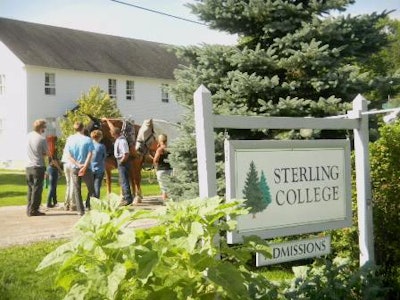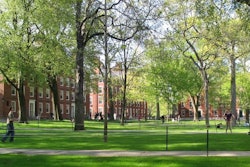
The arrangement not only makes college more affordable for students who otherwise might not be able to go, it also gives them real-life experience, teaches them responsibility and how to work together, officials said.
“I love it,” said Melissa Eckstrom, of Philadelphia, who is an assistant garden manager at Sterling College in Craftsbury, Vt., where she’s studying sustainable agriculture. “It’s really satisfying to work in the garden and do all this hands-on, you know, dirty work ― and I go to the kitchen and sit down for a meal and I’m like, I grew this. It can’t get more full circle than that.”
With rising college costs and a national student loan debt reaching more than $1 trillion, “earning while learning” is becoming more appealing for some students. The work college program is different than the federal work study program, which is an optional voluntary program that offers funds for part-time jobs for needy students.
But at the seven so-called work colleges ― Sterling College, Alice Lloyd College in Pippa Passes, Ky., Berea College in Berea, Ky., Blackburn College in Carlinville, Ill., College of the Ozarks in Lookout, Mo., Ecclesia College in Springdale, Ark., and Warren Wilson College in Asheville, N.C., ― work is required and relied upon for the daily operation of the institution, no matter what the student’s background. The students are then evaluated on their performance.
“It’s a core component of the educational program,” said Robin Taffler, executive director of the Work Colleges Consortium.
“It does not differentiate between those that can afford to pay for their education, from those that must work to cover their educational costs. And that’s a big deal. No student can buy their way out of this work program. So this essentially levels the playing field because everybody is doing a job,” she said.
Eckstrom works up to 100 hours a semester at $11.10 an hour, so the pay helps with her school costs, she said. She also gets tuition credit for coming a week early for training before the start of the school year.
“It’s all very helpful,” said Eckstrom, 23, who said she probably couldn’t have afforded to attend a school like Sterling otherwise.
The average debt of work colleges graduates in 2010 was $12,121 compared to $27,710 for private nonprofit college graduates, $21,740 for public college graduates, and $33,050 for graduates of private, for-profit colleges, according to the Work Colleges Consortium. Sterling’s average loan debt is $16,800.
Three of those colleges ― Alice Lloyd, Berea College and College of the Ozarks ― fully cover the cost of the tuition, through work, grants and donations.
The schools save on operational costs by having students working on campus and running the daily operation because they don’t have as much staff, Taffler said. But that doesn’t mean the work program is inexpensive for the schools to operate. Some funding is available through the federal work colleges program but the schools must match it dollar for dollar.
“So it is not necessarily an inexpensive program to operate,” Taffler said. The schools that offer full tuition do a lot of fundraising, she said.
The “earning while learning” concept appears to have become more appealing to students as a way to pay for college.
At Sterling College, enrollment was up 26 percent in the fall of 2013, while the rate of applications rose 38 percent from last March to now. The number of applications to Berea College has steadily increased from 1,362 in 2009 to 1,620 in 2013.
The Work Colleges Consortium reports that 75 percent of graduates agree their college work helped prepare them for their first job and 84 percent said it helped them to get along with people with different attitudes and opinions. Seventy-five percent of graduates agreed that their work experience helped them to understand the importance of service to others and 86 percent said it helped them to appreciate the value and dignity of work, the consortium said.
Charles Elliott, of Huntsville, Tex., will be graduating this year, debt-free, from the College of the Ozarks, a private Christian school, called “Hard Work U.” He’s worked in the school’s restaurant in the kitchen learning how to cook, as a waiter in the dining room and at landscaping and is now working in the public relations office. It’s taught him how to juggle his time between studies and work and given him experience that has helped in finding a job with a software development company.
“I’ve had opportunities to work in four different places here on campus,” he said. Instead of looking like he can’t stay at a job very long, it actually shows “I’m getting much more experience in different fields,” he said. “It’s a really great thing.”















